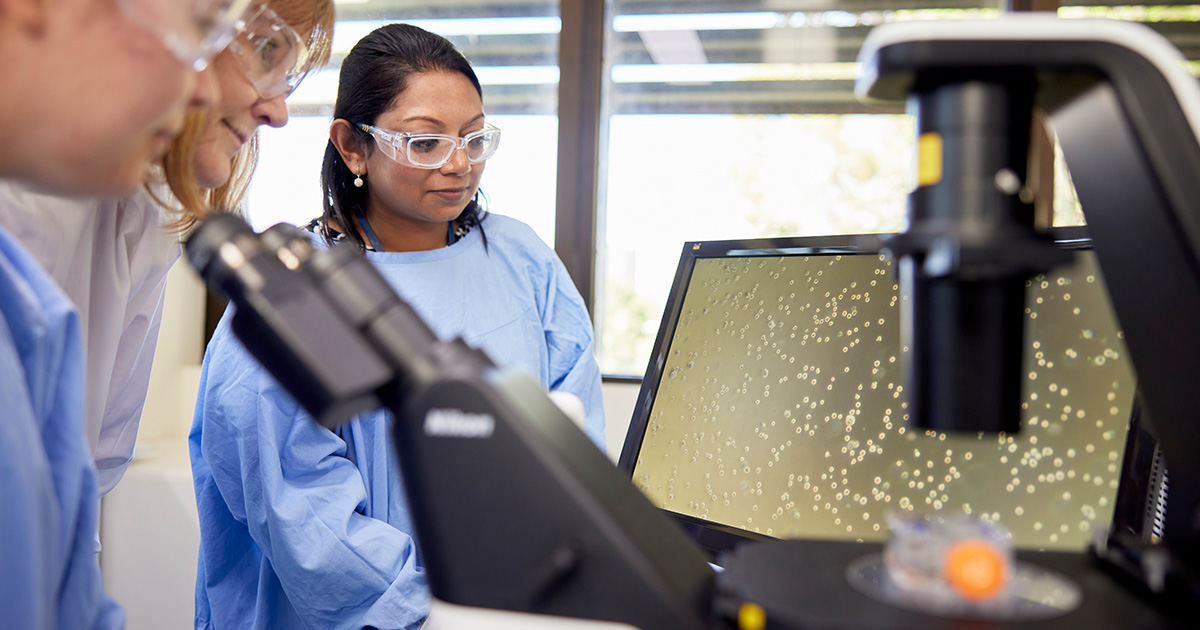The Woolcock Institute of Medical Research

The Secret Life of Microbes
Research into the interactions between humans and microbes is nothing new. It can be traced back as far as the mid-seventeenth century and understanding microbes helped scientists find answers to some of the world’s greatest disease challenges including malaria, cholera and stomach ulcers.
What has changed with advances in genomics and other areas of microbiology is the way we view the bacteria in our bodies. The human body contains trillions of bacterial cells, they outnumber host cells by a factor of 10 and extensive research, primarily into gut microbiota, has established links to sleep, digestion, immune function, mental health, endocrine disorders, heart disease and cancer.
MICROBIOME AS MEDICINE
There’s few who would now question that a balanced microbiome is important for general health and wellness but the microbiome as a medicine still has a long way to go according to Professor Maija Kohonen-Corish, director of the Woolcock’s Centre for Lung Cancer Research.
It’s an area of research where she has concentrated her efforts for more than six years and, she says, we’ve only just begun.
“How do we manipulate the microbiome to ensure the best outcome for medical treatments? There is so much to go on with this line of research. It has huge potential. We already know how important the microbiome is for immunotherapy outcomes and I believe there’s so much more.”
Professor Kohonen-Corish’s interest in the microbiome started with her work as a geneticist in colon cancer research. In the 2000s, her career took a turn with an international project to identify biomarkers to determine the best course of treatment for patients with lung cancer.
“Biomarkers are like a personal signature for a tumour. They show which drug to use. We helped develop practical, diagnostic tests that are now Medicare-funded and determine whether patients have one of the biomarkers that enable targeted therapy. If they don’t have those biomarkers, then the patient will be treated with immunotherapy or a combination of immunotherapy and chemotherapy.”
Want to stay up to date with our research on sleep and respiratory conditions?
Sign up to our monthly newsletter
THE ROLE OF ANTIBIOTICS
“When this happened – only a few years ago – we realised how important the microbiome was for treatment of lung cancer with immunotherapy treatment. Then, collaborating with epidemiologists, we found that if patients take antibiotics before they start chemotherapy, they don't do as well and that's linked to the microbiome. We now have conducted a follow-up study with antibiotics taken during therapy and we will be able to isolate which treatments are affected by antibiotic treatment – immunotherapy, chemotherapy or targeted therapy.”
Getting specimens to study the gut microbiota of lung cancer patients has been challenging – however, it has led to a whole new line of research for Professor Kohonen-Corish and her team – the lung microbiome.
Until recently, the lungs were thought to be a sterile environment, but we now know that they are home to their own dynamic bacterial population and that it has an equally important role in regulating immune function and inflammation. We also know that the microbiome of people with lung cancer differs significantly from people who don't have lung cancer. The presence of certain bacteria may even predict those more likely to develop lung cancer or have it recur following treatment.
LIFE IN THE LUNG
“We have a new collaboration with lung specialists at the Faculty of Medicine, Health and Human Sciences at Macquarie University who are interested in this lung microbiome. This means there is more opportunity to expand our research. At the moment we are at the phase where we are analysing a big batch of data. We don't know what we're going to find because it's so new.”
“It’s the same with our research into antibiotics and lung cancer treatment. They are tied up, but they are actually separate. It’s not just the microbiome, there’s something else going on as well. It may be that certain antibiotics actually have some kind of interaction with the cancer drugs in the body which can improve the effectiveness of those drugs. Our study looked at a large cohort who were having chemotherapy or targeted therapy. This was retrospective data, from a time when immunotherapy was not as common a treatment so that’s what we now have to look at.”
“Every step we take brings another question. The projects we are working on the Centre for Lung Cancer Research are long-term and have huge potential.”
Find out more
- About our Centre for Lung Cancer Research
- Support our lung cancer research with a tax-deductible donation










